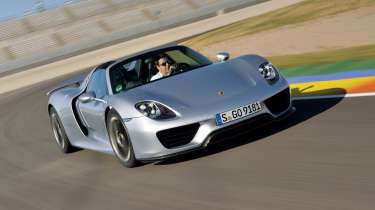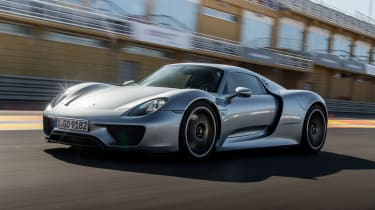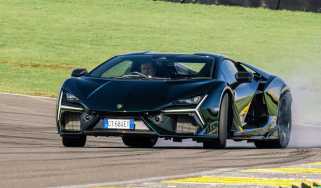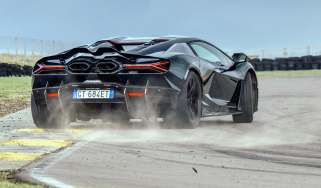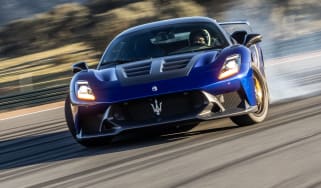Long wait for Porsche 918 Spyder replacement
Powertrain decision still yet to be made, says CEO, but Porsche remains committed to petrol
Porsche won’t make a decision on the replacement for the 918 Spyder hypercar before 2025, confirmed Porsche CEO Oliver Blume at the reveal of the company’s first all-electric car, the Taycan.
‘Hypercars are an important topic for Porsche,’ said Blume, ‘but what we decide to do has to be the best and benefit future Porsche models. If you look at the Taycan there are learnings with this car that we made with the 918 Spyder. And this will have to be the case if we produce a new hypercar.’
> Porsche 918 Spyder review - better than the McLaren P1?
Asked if a 918 replacement will be a pure electric hypercar to rival the likes of the Pininfarina Batista, Lotus Evija and Rimac C_Two, Blume wouldn’t be drawn: ‘We haven’t decided if our next hypercar will be electric – we haven’t decided what form this car could take.
‘We need to be clear on the technical configuration first, then we can make a decision on the direction of any new Porsche hypercar. We will make this decision sometime between 2020 and 2030.’
When asked about the forthcoming hypercar regulations for sportscar racing and Le Mans, Blume said: ‘Le Mans is always part of our motorsport strategy, but we won’t engineer a hypercar only for motorsport. It also has to be an innovative road car.’
During the launch of the Taycan, which took place at three locations around the world simultaneously – Europe, Asia and North America – Blume confirmed that Porsche will continue to invest in and develop its internal combustion engines, petrol engines specifically. ‘We will continue to invest in our combustion engines, but we need to find more efficiencies,’ he said. These efficiencies are likely to be found with the use of synthetic fuels, although Blume was quick to point out that these fuels are both expensive and in the early days of development for wider use in cars.
While the 911 will retain its flat-six engine, Blume didn’t rule out that the company’s heirloom will, within ten years, be offered with a hybrid powertrain alongside a range of IC engines. ‘We will continue to produce petrol cars, we will also continue to develop our hybrid powertrains and offer a new performance hybrid powertrain, too, and we will grow our range of electric sports cars.’
Porsche has already confirmed the next Macan will be a pure electric car and that the Taycan-based Cross Turismo concept will arrive in production form in 2020, and Blume is clear that Porsche has to build the right cars for the right markets. So while Europe and the US has little time for the four-cylinder Boxster and Cayman models, China can’t get enough of them. And conversely the US and Europe wants a return to a six-cylinder Boxster/Cayman, for which a new six-cylinder engine will soon be confirmed. He also said that within 12 months Porsche has to make a decision on an electric-only Boxster/Cayman. ‘We have to turn left or right if we make a new platform for an electric sports car. We have to make that decision soon.’
By 2025 Porsche wants 50 per cent of its total sales to be electric vehicles with a profit margin of around 15 per cent (as per the IC cars). While the Taycan and its spin-offs will go a long way to achieve this - nearly 30,000 pre-orders had been received before the car was revealed, over 3000 in Norway alone, a market that traditionally only sells 700 new Porsches a year - Blume is under no illusion that one electric car isn’t enough. But he is also very aware that managing the expectations of traditional Porsche customers and those of its electric cars needs careful handling.
Launching the Taycan was both a necessary decision for Porsche and one with an unimaginable number of hurdles to clear, but it’s how the sports car portfolio is managed from this point forward that will cement Porsche’s position as the preeminent sports car manufacturer for tomorrow.

